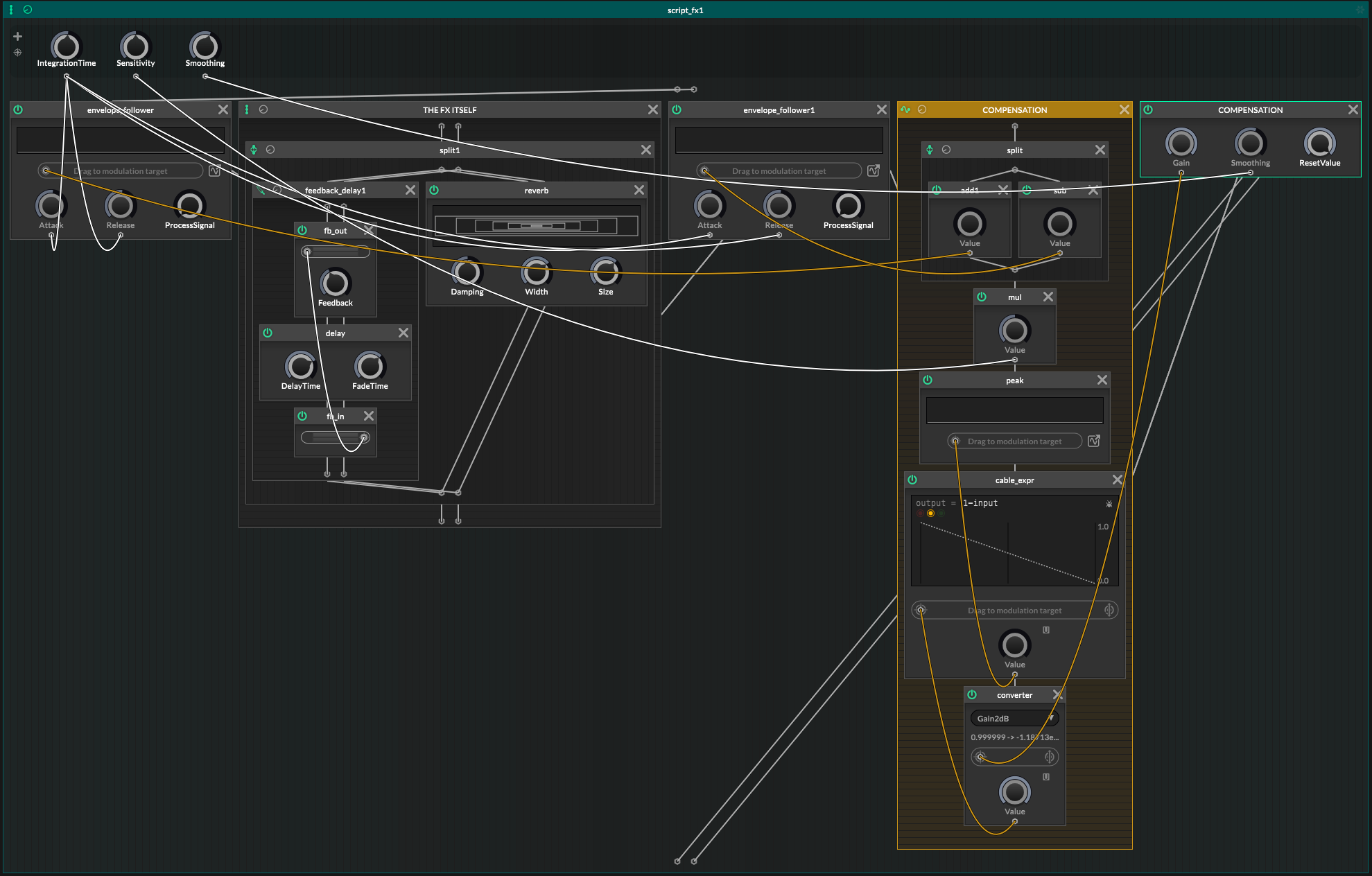Matching Gain Before And After Effects
-
the example of input dependency giving nasty fluctuations, might be:
- An input containing all frequencies
- A LPF in the effect, let say set to 1KHz
-> The difference between input an output will vary for high frequencies, leading to effect pumping while the output frequency content doesn't change (because those high freq are not passing through)
in short, the gain of the effect will fluctuate because of the input, while the effect itself doesn't sound different.
-
@ustk If the attack/release is slow enough it should smooth out the pumping?
-
@d-healey Saying this is just another way for what I am saying too.
A user compensating manually IS a fixed compensation (the user is not moving the knob permanently while the signal changes). So this is the "automatic" case covered by parameter compensation. (so automatic, but fixed because not input dependent, only parameter dependent)Compensation by IN/OUT comparison will necessarily introduce comp/expand like behaviour, more or less noticeable depending on the integration time (Smooth parameter in Chris's example, or att/rel of an enveloppe follower, or any integration value that a comparison requires if you don't want a sample to sample accuracy (which would be even nastier anyway)
-
@ustk said in Matching Gain Before And After Effects:
(the user is not moving the knob permanently while the signal changes
Sure they are, the knob is automatable for exactly this purpose. If the input goes up during playback they can bring down the output, and vice versa.
So maybe what I need is a threshold for the amount of variation to compensate for?
-
@d-healey said in Matching Gain Before And After Effects:
@ustk If the attack/release is slow enough it should smooth out the pumping?
Exactly you are right, reducing is not removing though, so if this is not an issue then you can go this way.
The issue is that if you reduce the integration time, it won't react fast enough and let the difference "pass-through" without being taken into account. You see, in the end you'll have a compressor/expander setting questioning. Fast enough to react or slow enough to be transparent? -
@d-healey
So maybe what I need is a threshold for the amount of variation to compensate for?
You are now describing limiter/compressor/expander

-
@d-healey said in Matching Gain Before And After Effects:
Sure they are, the knob is automatable for exactly this purpose. If the input goes up during playback they can bring down the output, and vice versa.
In this case effectively you fall in the slow integration case and you might go down the input/output compensation. After all, the ancestor of a compressor was a fader adjusted manually...
-
@orange Some compressors have auto makeup gain, how does that work because that's what I want :)
-
@d-healey To me, auto make up is a fixed compensation based on the different settings you adjusted, not an IN/OUT comparison (but I might have wrong here, or at least for some references)
in this case, Auto make-up is not assimilable to gain line automation (the fluctuating signal has no impact on the auto gain that is set. On many compressors, make-up gain is simply a gain control, auto-make-up is a gain control compensated when you dial the comp parameters
@orange exactly, Dave eventually described a comp/expander.
-
Dave eventually described a comp/expander.
Not quite, I didn't mean a fixed input gain threshold, I meant a threshold of gain difference between the input and the output. So if the difference between the two is more than X turn the gain knob to compensate.
-
@d-healey I see... Are you not afraid a threshold can lead in some nasty fluctuations?
I'll try to make scriptnode example that should work...
-
Are you not afraid a threshold can lead in some nasty fluctuations?
I don't know what I'm doing or talking about so I have no fear

-
@d-healey "FearlessDave"

-
@d-healey said in Matching Gain Before And After Effects:
Some compressors have auto makeup gain, how does that work because that's what I want
I had to calculate a formula for a makeup curve depending on the settings of the compressor controls. It looks like this:
Math.log(((-Threshold.getValue() * 10) * Ratio.getValue() +1) + (((200 - Attack.getValue())+1)/100));Results may vary

-
@Dan-Korneff Thank you! Looks like I don't want that after all, but still useful to know.
-
@Dan-Korneff said in Matching Gain Before And After Effects:
Results may vary
Thought we didn't want gain fluctuations...


-
@ustk "Results may vary" means the calculation isn't perfect. It's a constant level, but doesn't work great for light compression or extreme compression since peak Gain Reduction isn't factored in. Every other setting seems to balance out nicely.
-
@Dan-Korneff Yeah that was just a stupid joke attempt...

-
@ustk
ha! my brain must not be working yet.
-
@d-healey Alright I have made a little example of IN/OUT compensation that seems to work, with integration time, sensitivity is just a difference multiplier. High difference with ultra low smoothing time will make the pumping very apparent, so from there I guess it's just a matter of finding the most transparent settings...

HiseSnippet 2181.3oc6ZsDiabaFlizRsOrShcrMRNTTnCEsa.bWrZyiVfdPZeHYKTKsBdT23.TfMTyPIwtiHGLyncW0ldpH.8V5sB2G.sG5sdnG5g1aFnWS.ZaN0aAnn8Ru3KAHWJZ+4LizPJM6ZIYsarChLfwxe9Sxu+m7mCYCOgE02W3gLVs4.WJx3pXyA7ft61kv3np6gLdQbMhe.0KeDocF3R78o1HCir2QRvX0kPg+dbwcHNDtEMgDBcffYQuGqGKHgZiReWliSEhMsIqmB2uQopVB9tBGQe.OYwahbIVGQ5PqSjrkAiLxU1lEH7LCHATejwR6HrGX1UbBOh+CX9rVNTYiBHSXhhHWQ3XKQrjJZ2tLG6FCkaeDx.2HQKjMRKbSbMlMaD8Dsw0B6HexHT0GFYzgWVM3UPEdap.uTfjgBjVJBRWGaZ4wbCR5QhmqfqxAiSaBn1UgRDuHiGg2U.LvC1nG4HZEOnwnAr9as4l2NO7eu12ocetU.SvyK30EAz84q+Zq8iVa009wqke7tZ2N09jKimvwg5kZ2RKs24Mv04860h5c67GSb5SGwHH955T7YqSUM4VQRsBiBdUNKXeWJ+rbDPwpJ3u9dU2iDPjFhXZ.etTu.lDBF6QOF7piLKqh2i5eTfvE7qmvlAdKB69Nj.cWHYbSbGfNPytIMNbeVv.03pEle0zBwqiavBr5lNFyjBFAM0EAFiiFeAb41soVAI.bIbkGb4E5sVbnGrlxE+pwMyW4AERMn6mhSbvc8ntDOZSQCGxf08I8bcn2Gv3sy2xQXcjI6GRmLpvMBB6H4XcqtDNm53OOAO4lZsRgy2nbeQ+.FuSMRfG6THJrd+dlPZZK5twnCnYjQFCE0dSYaoegIkaG13+A+h6rfrsQbmEF1oR3WcZvIBuiBMGw+MxX4HcuenR9v1mV.ssii3jcE8bYwdofMHjVCgy.2tBNyRRJhigHc6dh9vhDC26R7aRXNR2Zy99PxA684l.ygaiYj8.pme3DuLdyMf+At40E1PW4pPr.E6fFjftx3EY9Fv4j5sg0HmTMrp5mHmhgayEok.H1SJ5xM4j1mFDOXOOHOsLcSFirJoeh7Pksf3uLQqSU+Cj8ZQbPGH8.jKBRtJgauEgXrj0afo7ioNvvOrsPpondHMI4qfsGvI8XV9aLImSuLXrjJhQIIRZR75PC7iyrxoVQ1sPsZUXhygI1fKwH4WRaYbjPIWAH54zgol2i46BAU6zGRNDE5pQQpc31zSG5eUFBQrg5.BG9PeNEEM36OpErn0X7XcYRRtZjS0oU5CJYFPckQwwz9MO7g+4hlGQOIRsFSM+G8q+nhRCvJ3sCBfpZFZmv3sdyMQa2OPzCBQCSuht3Qwp36ScnDe5TBibSELfcpFCFg+l.FgbJgwKMrxKSVGdhuaxPQQttKGwby6VFR4luZSyx2qB5ID.N89pCqNDxeOdjW14IxKynHOCkHuUvfqIKnvYi6v9mkXLMrMZQynrnWG2lRsaA9aGZSg.iwV8WQY0ayN8025vv8jlILLbYypIqsacHrgw3xpWzlHa3Qsnrioyx5jQSV0hZMt3cTWCWIVOl3i9Kdn72+nHRQvWFGpl0k6qAZYOpTAGYDVPhclYVrm1zDu6M16iKFc3h8j.N7TZJS0e7u+g+pSJMG4G9YklTs+3hmqZe3gD0moG79kzU6f+FDyqo1ewQta9vt5ysROkXdkMthg0HGdMSDZdxcnMAZwTdziodszExqfae5FwcrXbqxdwGMAGYBJCFrLIV0+xmt92+C95eRwKgMcVF+1LaP2MZZ947W9mft1+9xXsygC4czr7Yl+ye2u7k9WEGys4LbAt4jEuU3Yqp2vX+9s9xh29xh2TJdCG8QD2c+ZMJW2b6lU2uttS6MUpBomvdVKe6oqDMr11HQkfcYVgV74czVx0vfcr6FPGW.UHs7EUV0nIXhoV2sTQxixUjlfKo+EMA+rxoiw856jpVPR+RQK73hSpEtYomRsve5q99+m+1+MSoyz7mC6RIGMd0LgUJG1wkvtUWEaQZ4POjdpq2mOaZopPzPSJIH8DNanvwbmfLyXIHyA0yZmX4vE9lLtaXor57sLbXfV86n7AlldMszvB0i3IcASWQ+re9JUYPy7biDyyHFVXaekS944UrNxqNXK6clsOo1c1tZcc8dtvI54trkwhRZIM5LiUMLkGAJE8v67nI0CfLOM0v8nN+gaUJVPj3cZUCK5ZIUNguYOgHnq1gwPnWEidW6RyREkKBkxUgBa8oAmgGx4bL0nO0k7Zo53EERH+jAK9puUF5l+1G9N0KoFwIQ0RoF.l1GcWKZbz4JPy23SNQP5SPpGbbVPvSdBTfv3VlW.aFdcgrikWY3hu9iQC8aTXke+6YrxDVky5rpxJrdB6FEKBpgIK9.Qkg57we368ClRAHs75p.EsiPbTOR30n8Teg12JpyqfeaxwzvWHR3Ubcqv1sEd8xeGJbDI40HW3bdiH+0o8Mh3N0uQj8sB.Hzziv8cE9zBpy7X8skZe6QC5y0YOhjFWRwqBHdJ7sRogD2RkXCBWaxf1ZyTM48lNr4mTrLWVKmIEjF688s.gkLleci9N9zvuUUA0AlPdKUx2k3YC1EKs6jO648bYJLmOWlbOy8bYdN3kWn8rBVcHFMYxiWTNN2ZHFeYH7qMouSvPp5gS0Dbwva1NwPeeZfGqSGpd8VoIPwo4URzNLu8HResR2iwoDuvBOmOcQgY9IVjp85Ui2UJuLGP9meewLY+B8KlY5i9fTfOaaEeELjJdq7glx7e9XKuLdnMWFqQOhkm3v3SFKC5WIjBH27vWy4p3Zx14KfNd7po5AaYbnkk9TMw.2ZdG3qOuC7Ml2A9ly6.eq4cfeq4cfe6m7.k6nGezPYrATYSixQegKinhZBCSP+evIyiak